Welcome to the 146th edition of Trade War and the first of 2023.
I have decided to make this issue free so please enjoy.
In this edition we will be playing a bit of catchup, given the recent holiday break, and it will include important news from the last few weeks, a longer time period than usual.
And a heads-up that some changes are ahead for Trade War in 2023; here’s a notable one: I will very soon launch a new chat function to give you a chance to jump into the discussion (usually only available to paid subscribers.)
Look out for details on that ahead.
On to the news . . .
As Covid has swept across China, infecting millions and leading to an as-of-yet uncounted surge in deaths, the question of why the move to end pandemic controls was so abrupt and seemingly ill-planned, is now being asked.
China’s economic numbers paint a grim picture for the country’s prospects in 2023. Xi Jinping gives a New Year’s address which is surprisingly conciliatory. Policy-makers to lift restrictions on the indebted property sector in an attempt to boost growth. And Tesla-owning urbanites protest against new price cuts.
After battering big cities including Beijing, Shanghai, and Guangzhou, the next surge of Covid is coming to the relatively unprepared rural villages of China. And Xi’s standing likely to be damaged by the chaotic transition.
Behind Beijing’s abrupt Covid policy reversal
In an interview with Disruption Banking’s David Whitehouse, I give my take on what drove the sudden shift on Covid Zero.
The dire state of the economy, the risk that local governments would run out of money, and the government’s realization that they were failing to stop the spread of the latest Covid variants, were the three main factors, I argue.
“While the protests may have convinced Beijing to move faster to end the policy, that was only a matter of timing,” says Roberts, publisher of Trade War, a newsletter on the Chinese economy and business. “The regime already knew that the policy was unsustainable.”
China will continue to struggle with controlling Covid for at least the first quarter of 2023, which will disrupt manufacturing and supply chains, and continue to weigh heavily on consumption, Roberts says. Coming from a low 2022 base, China is likely to see a surge in growth in 2023 that could easily top 5%, he predicts.
That “does not signal a healthy economy,” Roberts argues. The country continues to face huge challenges, including “lacklustre household consumption, destabilizing debt, a rapidly aging population, and excessive government influence over the economy.”
People are now more likely to demand concessions from government and “may well push back against future government policies,” Roberts says. Yet the government retains a strong capacity to resist popular demands for a more responsive leadership.
“The full power of China’s surveillance state plus the enforcement capability of the public security forces can and will likely be used to squash future demonstrations against party policies,” he says.
Still, the abrupt Covid policy shift has “badly damaged the population’s faith in the party, and likely does therefore mark a shift in the regime’s relationship with the people,” I argue. In the future, people may be “far less likely to assume the party knows best when it comes to running the economy, society, and the political system.”

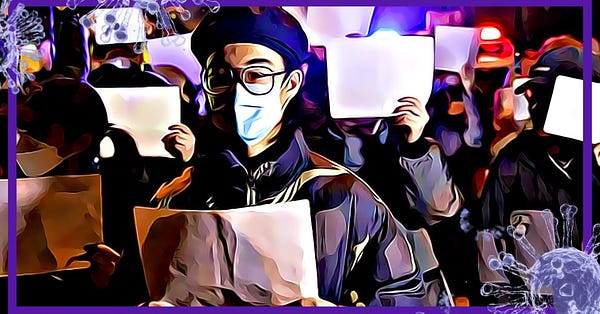
Left, then right, (then left?)
There is now substantial evidence of major policy shifts happening in China. One, of course, is the 180 degree shift on Covid Zero. There are, however, other important signs of change.
Those include a loosening of controls over the struggling economy, encompassing the property sector, technology companies and private business, and a shift from the wolf warrior approach to diplomacy to a more conciliatory stance towards other countries in Asia, as well as the the EU and U.S.
What is driving the changes and how long will they last? asks Institut Montaigne’s Francois Godement in an essay titled Xi Jinping: the Emperors New Clothes.
First, don’t assume Xi has somehow been sidelined, allowing other leaders to take charge and drive the new approach to policy.
“There have been rumors that these changes are nearly equivalent to a palace coup, and that Xi is not in control of many domestic policies at this point,” writes Godement.
“Were there other portents of division at the top or in the ideological discourse? This might be a marker of factional strife underway. But there is none to see. It is more likely that Xi is not eager to stand up as visibly in front of the entire leadership as China navigates a Covid tsunami,” he explains.
“More than the hypothesis of a sudden power shift at the top, more than the dream of a sudden conversion by Xi to some reform policies, the most likely hypothesis is that he has perceived a change in relations among great powers that is definitely not going in a direction that would be favorable to China.”
“The resolve among American and European allies, Russia's setbacks which include some lessons for Taiwan, the vigor of the Biden administration's high technology decoupling, and the rise in military budgets around China, all have consequences for the People's Republic. In several key areas, Xi Jinping has perhaps decided to lessen immediate risk-taking and to offer less of a target to those that he sees as adversaries, outside and inside China.”
“Left, then right, (then left?) is also a leaf from Mao's book,” adds Godement. “Beneath the ideology and struggle mania that Xi has promoted in the past decade, there is also a whiff of the pragmatism and opportunism that he had to practice as he came back from a political no man's land to climb up the ladder of power.”
Godement reaches conclusions I agree with and indeed have made recently in Trade War (Newsletter 145 - December 18, 2022): that the shifts are tactical moves in response to the rising internal and external challenges facing China, not part of any serious change of ideological heart, and therefore may be relatively short-lived.
End to Covid Zero slams economy
China’s dramatic move to end Covid Zero, intended to help boost growth, is instead wreaking havoc on the economy, reports the New York Times’ Keith Bradsher.
“The chaotic approach has contributed to a tsunami of infections that has swept across the nation, overwhelming hospitals and funeral parlors. In many industries, truck drivers and other workers have quickly fallen ill, temporarily stretching staff and slowing operations,” writes Bradsher.
The result: a double whammy hit to the manufacturing and the services sectors, both of which saw their their biggest contractions in December since the early days of the pandemic in 2020, a new survey shows.
“The epidemic has had a great impact on the production and demand of enterprises, the attendance of personnel, and logistics and distribution,” the National Bureau of Statistics said in a statement (Chinese).
The economic pain has some multinationals accelerating plans to diversify production out of China. The latest: Bentonville, AK-based Walmart, which plans to source $10 billion a year from India within five years.
China’s exports fell in November, with a 25 percent drop to the U.S.


Xi’s conciliatory New Year speech
In his annual speech to the nation, Xi Jinping struck an overall more conciliatory tone, describing China, as “a country closely linked with the world,“ and calling for “people of all countries [to] live in happiness.”
“Ours is a big country. It is only natural for different people to have different concerns or hold different views on the same issue,” Xi said in what appeared to be a reference to the recent protests against pandemic restrictions by Chinese youth and workers.
Xi’s comments on Taiwan were also seen as milder, with China’s leader saying he “sincerely” hoped that “compatriots on both sides of the Strait will work together with a unity of purpose.”
“Does Xi Jinping have a new speechwriter? Less boasting about the CCP and a more humble tone. Starting with this uncharacteristic sentence: “The Chinese economy has remained the 2nd largest in the world,” writes Nikkei Asia’s Ken Moriyasu.
Here in this link is the English translation of Xi’s speech.

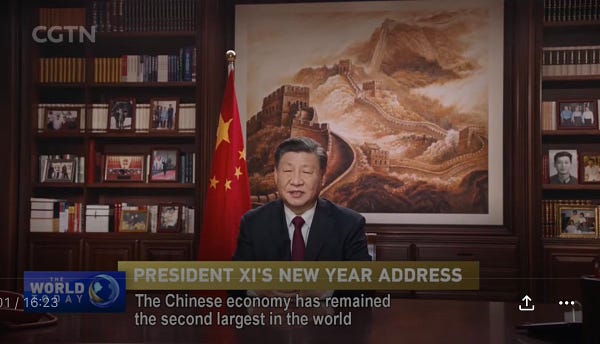
A ‘badly wounded’ leader
“We can see very clearly that Xi Jinping is badly wounded in the sense that his prestige and authority have suffered tremendously,” Chinese University of Hong Kong’s Willy Lam tells the Financial Times. “His claim that the Chinese system is the best in the world is now subject to serious questioning.”
Further damaging Xi’s prestige is the fact the pandemic is being felt “not only by ordinary people, not only the disadvantaged classes, but even senior cadres, their parents and retired senior cadres,” Lam adds.
“The core is not whether Xi lost credibility because he changed the zero-Covid policy. Instead, it is: if changing the policy was inevitable, [why] didn’t he do a better job preparing for the consequences?” asks Stimson Center China program director Yun Sun.
China’s leadership faces a “narrative problem” of “how they explain to their public what the hell is going on,” points out Yonsei University China expert John Delury. “Some serious damage is being done to public trust,” he said. “We may not see the immediate effects of that. But it’s going into the public calculus about how competent their government is.”

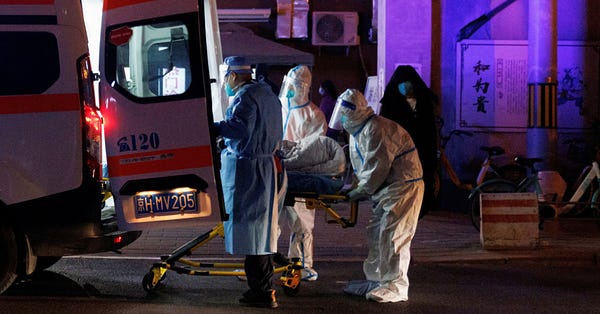
‘Three Red Lines’ eased to boost property market
China is planning to ease the rules restricting property developers from borrowing, also known as the “three red lines,” in an attempt to rejuvenate the ailing real estate sector, reports Bloomberg News.
“The policy reversal comes on the heels of a slew of directives aimed at reviving the housing sector, which accounts for as much as 70% of household assets in some parts of the country,” reports the financial news service. Home prices have fallen for 15 straight months.
“This is a signal from the top regulators in an attempt to help restore market confidence in the real estate sector and create a positive feedback loop between the homebuyers, developers, and the physical market,” says Zerlina Zeng, a credit analyst at Creditsights Singapore LLC.
But homebuyer confidence at record low
“Homebuyer confidence is at a record low in 4Q. [The People’s Bank of China] loosened the interest rate floor for the 1st home mortgages today. It will take a long while for homebuyers to come back this time,” writes Gene Ma, head of China research at the Institute of International Finance, responding to the latest news.

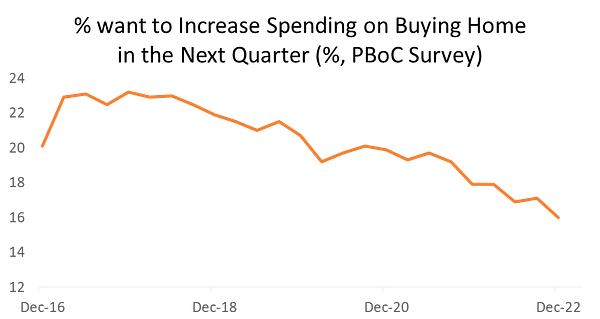
Covid surge to hit rural China
Even as cities including Beijing, Shanghai and Chongqing see a surge in Covid mortalities and struggle with overwhelmed funeral homes and crematoriums, there are signs the infection wave may soon recede in urban China.
Unfortunately, that leaves one-half the country still likely to face similar infection waves, reports the South China Morning Post’s Zhuang Pinghui.
In findings published last week, researchers from Ruijin Hospital and Shanghai Jiao Tong University say they expect rural areas of China to soon experience major Covid surges, with travel during the upcoming Lunar New Year festival accelerating the spread.
“Preliminary data highlight the need to allocate resources to early diagnosis and effective treatment of severe cases and the protection of vulnerable populations, especially in the rural areas, to ensure the country’s smooth exit from pandemic and socio-economic recovery,” the researchers wrote.
Protests grow against Tesla price cuts
Hundreds of Tesla owners gathered at showrooms and distribution centers in Shanghai and cities across China over the weekend, to protest again the company’s decision to slash prices, reports Reuters.
"Return the money, refund our cars," a crowd chanted at a Tesla store in Chengdu, Sichuan. In Beijing, police cars converged on a Tesla store also experiencing protests.
“These kind of protests (against price drops), commonly seen in China’s property market, [are] now seeping into the EV sector. This “social instability,” as the PRC views it, is likely to amplify as China’s middle class experience their first sustained economic downturn in a lifetime,” notes journalist Robert Foyle Hunwick.


Notable/In depth
"There is a risk of conflict with respect to Taiwan, but I believe that with responsible stewardship, we can ensure that this contingency never comes to pass,” U.S. National Security Advisor Jake Sullivan said to NPR earlier this week.
Avoiding a clash will require "hard work" and "coordination with allies," as well as “direct diplomacy with the [People's Republic of China]," Sullivan added. "We have to make this a priority to ensure there is not a war over the Taiwan Strait."

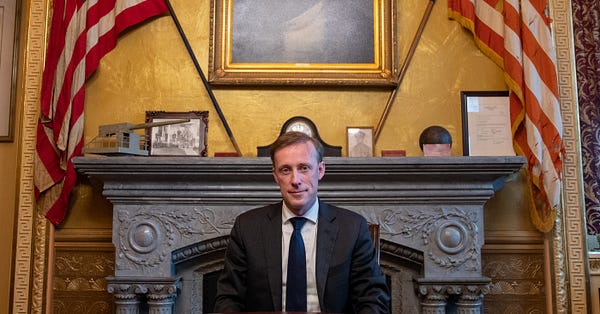
“This should be much better known [than] it is -- Americans holding Chinese stocks (most Alibaba and Tencent) technically hold claims on the Caymans (the Cayman entity in turn has a claim on China) not on China. The TIC [Treasury International Capital numbers showing capital flows in and out of the U.S.] data thus understates true exposure to China risk,” writes Council on Foreign Relations senior fellow Brad Setser in a tweet thread.
“Calculations are from Bloomberg, reporting on work done by [very] good economists at Stanford and Columbia. I do . . . agree with them. They don't claim to capture secondary exposure (i.e. Apple's profits from China, which of course show up in Ireland not China)”

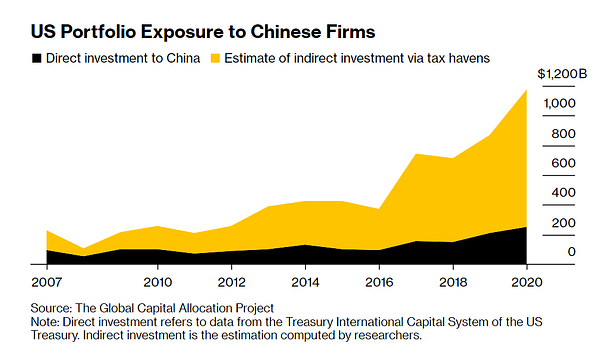
Speaking of Apple, even as their key contract manufacturers including Foxconn move a portion of their production of iPhones out of China and into other Asian countries, it’s not going to be easy.
Watch this video for a quick explainer on why diversifying is so tough (Spoiler alert: it’s all about the production ecosystem; of Apple’s more than 180 total suppliers, 150 are in China, but only 26 are in Vietnam and just 11 in India, two key destinations for new factories.)
Check out this thread that includes links to a host of great scholarship produced in China last year —in spite of all the roadblocks Beijing has thrown up to independent research.
Notable articles include one on the role of the state in Chinese economic history (pdf) and another on the impact of Covid on China’s migrant workers.

“The 20th Party Congress in Beijing in November highlighted just how much power Xi Jinping and his closest allies have concentrated in their hands . . . in such an environment, information on public opinion or policy outcomes becomes less reliable due to pervasive censorship in the media and incentives for lower-level officials to falsify data,” writes Ilaria Mazzocco, senior fellow at the Center for Strategic and International Studies.
“One particularly important source of information, however, is through surveys and analyses of large-scale trends conducted by third-party contractors that help the central and local governments better understand public opinion on a range of issues.”

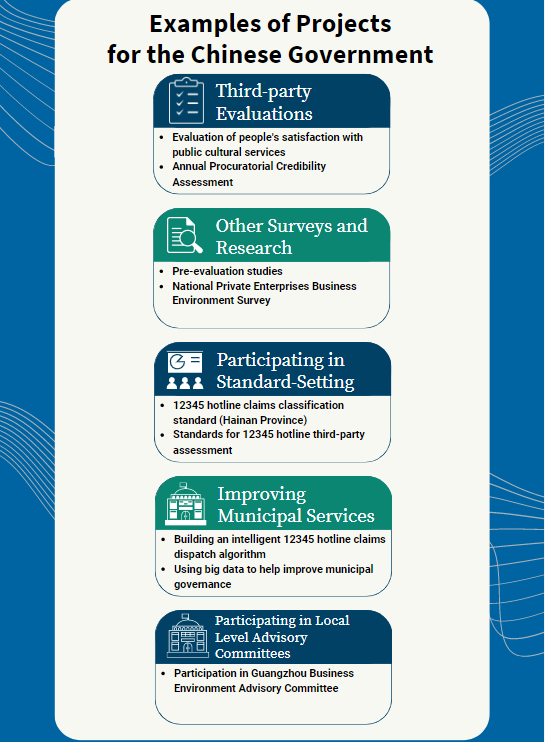
Oregon picture
A sunset in Klamath Falls, Oregon, just north of the California border.





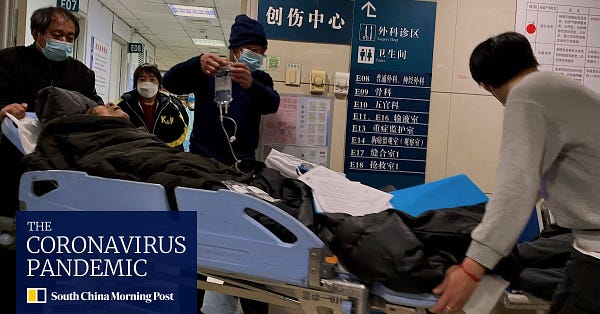

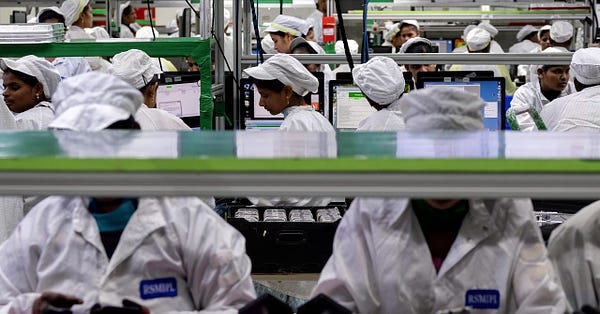
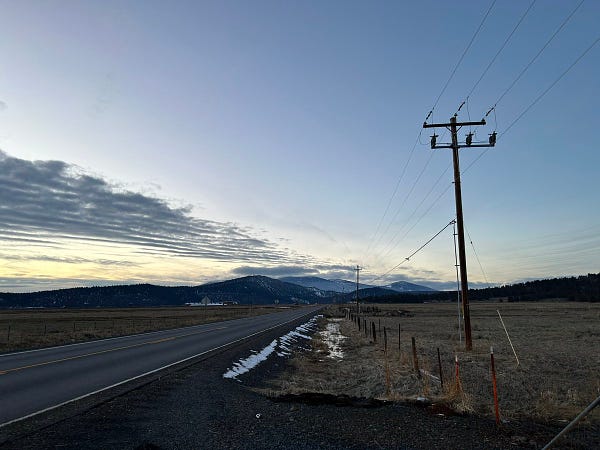
I just can’t figure out why CCP switched covid zero to turbo open. Was it due to impending financial squeeze?? Saw an article about shortage of gas up north due to local governments out of cash. If so, overwhelming the medical system is not going to improve their finances!!